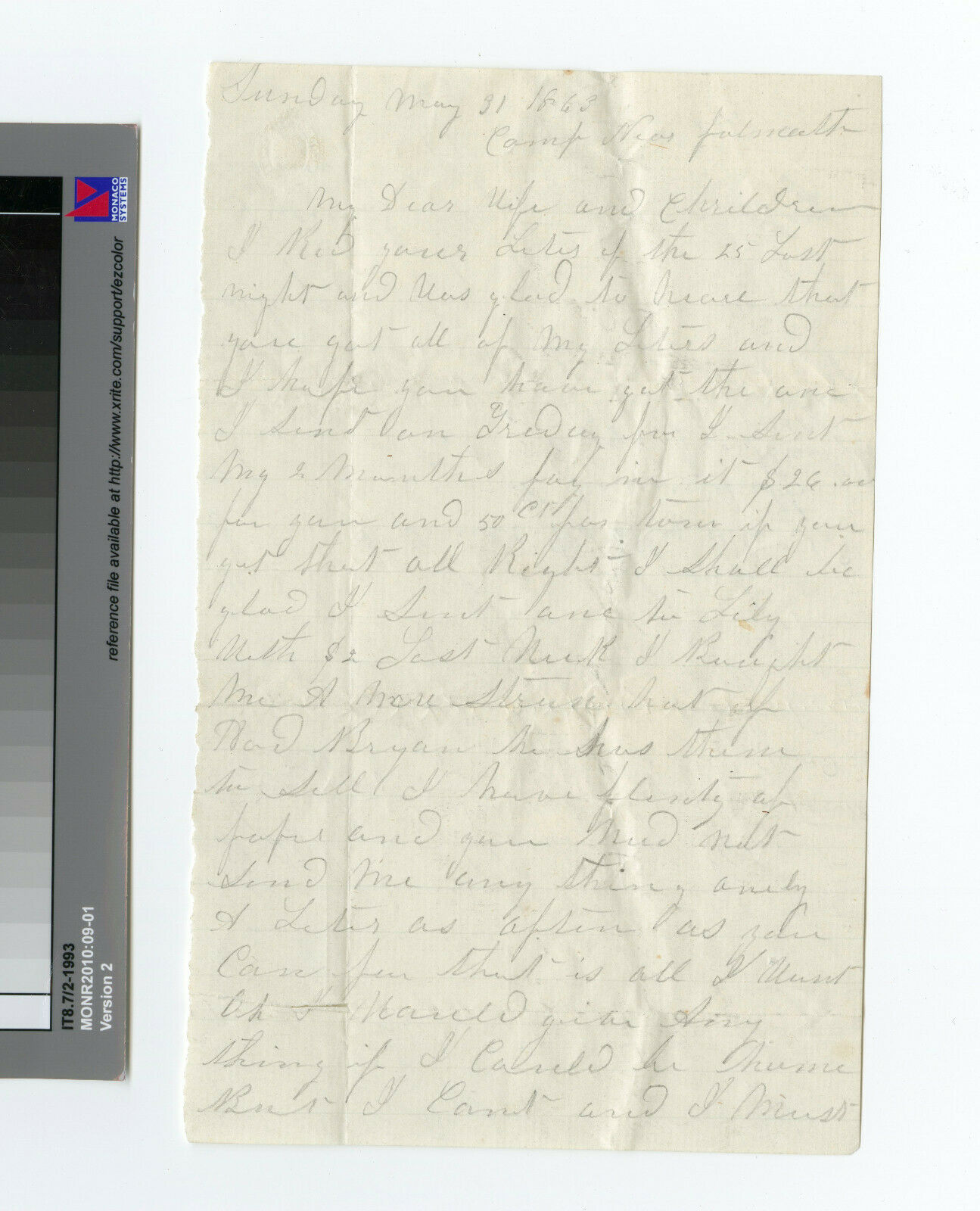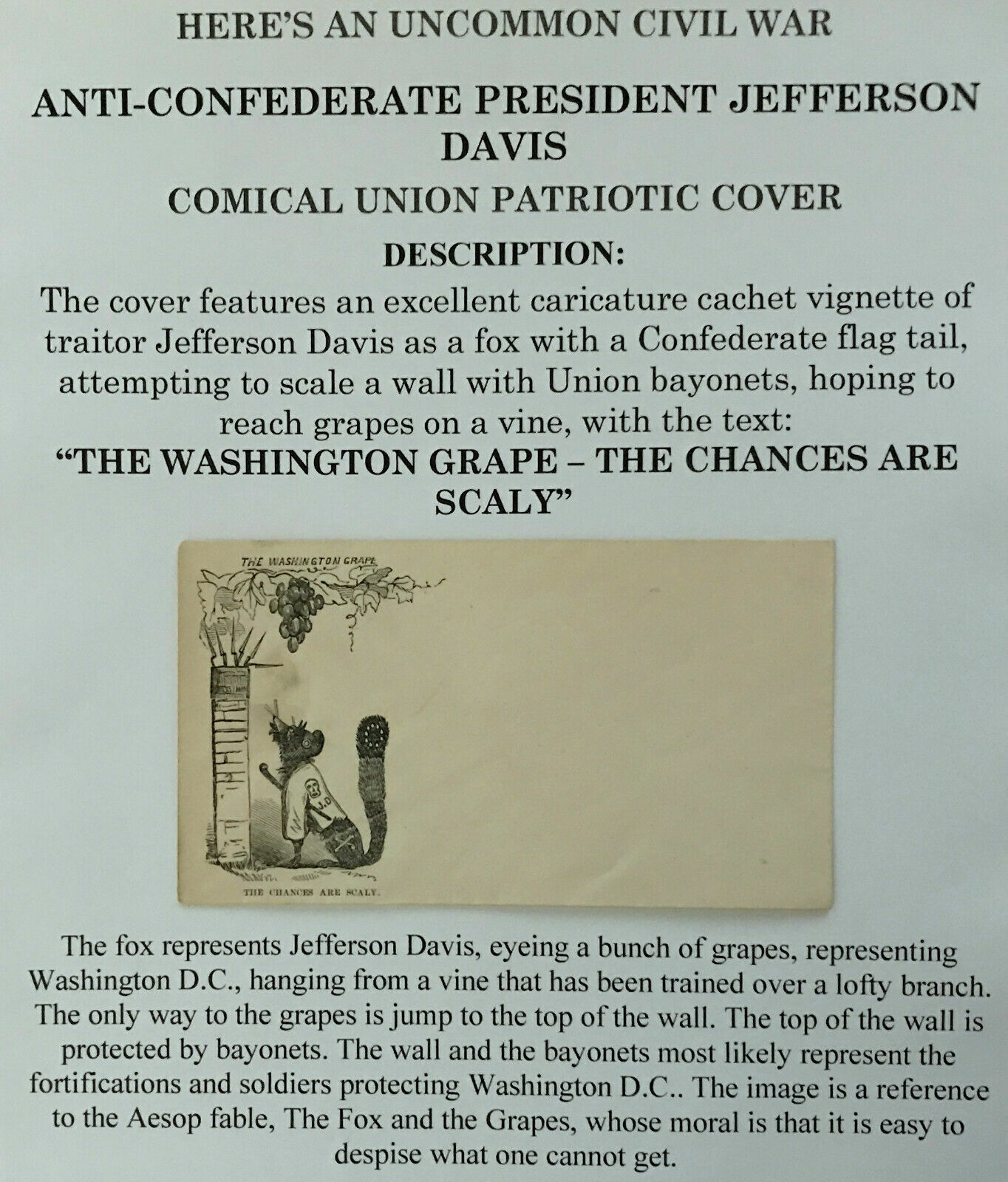-40%
140th New York ‘Rochester Race Horses’ Pvt. to His Wife re Sex. Dies in 1863.
$ 118.8
- Description
- Size Guide
Description
A Middle-Aged Private in the140th New York ‘Rochester Race Horses’ Writes His Wife
“
I have bin Down to the River this Morning and had A good wash and my Body is Clan Enough to sleep with a Woman but that Cant be So I must be Content untill I get out of this War and then I will see you About that
”
ERASTUS U. POLLAY, Autograph Letter Signed, to Julia A. Pollay, May 31, 1863, Falmouth, VA, 2 pp, 8vo., one slight fold cut (text not affected), otherwise fine condition.
#21265.12
Complete Transcript
Sunday May 31 1863
Camp Near Falmouth
My Dear Wife and Children
I Recd your Leter of the 25 Last night and was glad to heare that you got all of my Leters and I hope you have got the one I send on Friday for I sent my 2 months pay in it .00 for you and 50
ct
for tom
if you get that all Right
I shall be glad
I sent one to Lily with Last Week
I Bought me a new straw hat of Ned Bryan
he has them to sell I have plenty of paper and you need not send me any thing onely A Leter as often as you Can for that is all I want
Oh I should give Any thing if I could be home
But I Cant and I Must <2> get along the best I can
I hope we shall git home this fall
I have bin Down to the River this Morning and had A good wash and my Body is Clan Enough to sleep with a Woman but that Cant be So I must be Content untill I get out of this War and then I will see you About that
tel Linny I am well and should be glad to see him walking into our Camp
I think Generl Hooker would Let me come home with him
I Eat 5 Eggs for Breakfast and I feel prety well to Day
My Love to you all So good By for this time
E U Pollay
Julia A Pollay
Tomy & Lizy
Historical Background
After his defeat at the hands of Confederate General Robert E. Lee at the Battle of Chancellorsville in early May, General Joseph Hooker withdrew his Army of the Potomac across the Rappahannock River and encamped near Falmouth, Virginia, just a couple of miles across and upriver from Fredericksburg.
There, Pollay wrote to his wife and children about camp life, a bath in the Rappahannock River, and makes a veiled reference to physical intimacy.
Perhaps his statement that “
I think Generl Hooker would Let me come home with him
” reflected the soldiers’ expectation that Hooker would be replaced in command of the Army of the Potomac.
President Abraham Lincoln did not immediately replace Hooker after the disaster at Chancellorsville, but three days after this letter, the Army of Northern Virginia began its second invasion of the North.
By mid-June, it was crossing the Potomac River into Maryland and then into Pennsylvania.
The Army of the Potomac followed, crossing the Potomac in late June.
In a dispute with the president and General-in-Chief Henry W. Halleck, Hooker impetuously offered his resignation, and Lincoln accepted it, replacing Hooker with corps commander General George G. Meade, who battled Lee at the Battle of Gettysburg later that week.
Erastus Pollay
(1819-1863) was born in New York, and married Julia Ann Barnum at Rochester, New York, in April 1847.
In the late 1840s to 1850, he was a beer peddler in Rochester.
In 1860, he was a clerk in Rochester, where he lived with his wife and two children. He enlisted as a private in August 1862 and was mustered into Company H of the 140
th
New York Volunteers the following month. He deeply missed his family. In December 1862, on the eve of the Battle of Fredericksburg, he wrote, “I wish I could be home this cold winter for it is hard on the old man but he most stand it until god or Abraham calls him home and I hope it will be Abe and start soon.” He fought in the Battles of Fredericksburg, Chancellorsville, and perhaps Gettysburg. After spending some time in the hospital, Pollay was discharged on September 18, 1863, at Beverly Ford, Virginia. Pollay died at home on November 2 of chronic diarrhea, contracted at Falmouth, Virginia, from which he wrote this letter.
Julia Ann Barnum Pollay
(1823-1908) was born in New York. She married Erastus Pollay in 1847, and they had two children, Julia E. (Lizzie) Pollay (1848-1938) and Thomas U. Pollay (1853-1919). In 1860, she ran a boarding house in Rochester, New York. In 1870, she was still keeping a boarding house in Rochester. She received a widow’s pension of per month for her husband’s service.
Joseph Hooker
(1814-1879) was born in Massachusetts and graduated from the United States Military Academy in 1837.
He served in the Seminole and Mexican Wars and resigned from the army in 1853. Returning to the army during the Civil War, he gained promotion to Major General, and in January 1863, President Abraham Lincoln placed Hooker in charge of the Army of the Potomac. Known as “Fighting Joe” or “Old Joe,” Hooker was an aggressive commander.
Famously outwitted by General Robert E. Lee at the Battle of Chancellorsville in early May, he remained in command, until Lincoln replaced him with General George G. Meade on June 28, 1863.
Hooker led a corps under General William T. Sherman in the Atlanta campaign in 1864, and commanded the Northern Department from late 1864 to the end of the war.
SETH KALLER, INC.
Historic Documents and Legacy Collections
For over 20 years, Seth Kaller has been one of the country’s largest buyers of important historic documents and artifacts. More than 10,000 rare manuscripts, documents, maps, and books handled by Kaller are now in institutional and private collections including working drafts of the United States Constitution, Lincoln-signed copies of the 13th Amendment and Emancipation Proclamation, and rare prints and broadsides of the Declaration of Independence.
Kaller is a member of the Antiquarian Booksellers’ Association of America (ABAA), the Professional Autograph Dealers Association (PADA), the American Antiquarian Society, the Manuscript Society, the New-York Historical Society’s Chairman’s Council, and the Papers of Abraham Lincoln Advisory Board.
Authenticity Guaranteed
Everything we sell comes with our absolute guarantee that it is original and authentic. If this is ever proven not to be authentic it may be returned for a full refund.
History You Can Own
Whether you’re interested in the Founding Fathers, Documents of Freedom, Battles and Leaders, the Civil War, African-Americana, World History, Science, or a particular hero or villain, we can help you explore opportunities to take ownership of history.
Build Your Own Collection
We can coordinate every aspect of the process for you, from searching for individual items to building entire world-class collections for your home, business, foundation, or favorite museum. We can handle the pre-acquisition research, physical inspection and purchasing, auction representation, authentication, inventory, accounting reports, framing, and display.
Help Your Favorite Institution
Build a legacy by preserving history for generations to come. Through donations and loans to your favorite museum, library, or university, you ensure the survival of these important documents and act as a steward for personalities and ideas that shaped the world. We handle all the arrangements including insurance, transit, and proper acknowledgement for you. Donating can also bring substantial tax benefits. We have considerable experience working with tax attorneys and accountants to help maximize your benefit or minimize your cost as you promote your passion for history.










